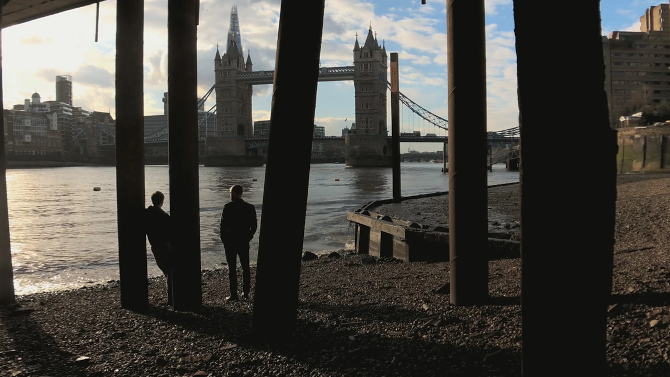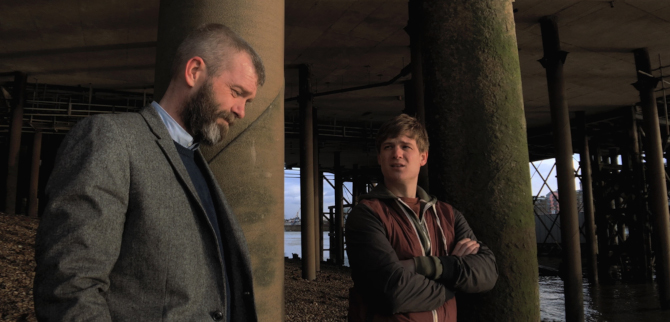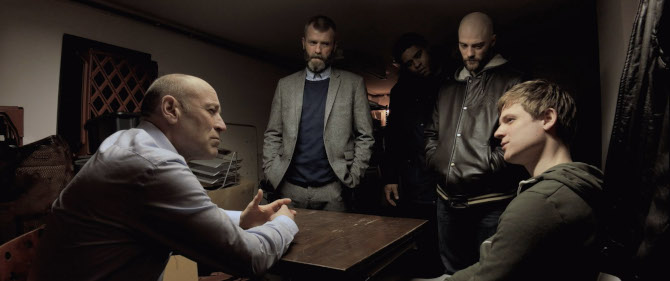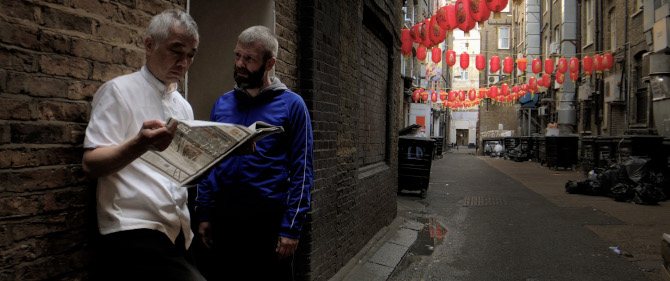An example of Indie, guerilla-style film making, Anthony Z. James writes, directs and produces his first feature film, 2020’s Ghost (also known as Ex-Con); shooting on the mean streets of London, the production was simply shot with an Iphone (with an anamorphic lens) – something you will find increasingly hard to believe the longer you delve into this motion picture.
Dropping us into an important day in the life of Tony Ward (Anthony Mark Streeter), the man is officially an ex-con – just released from prison. Following him in his first steps back in the real world (approximately seven minutes without a word of dialogue – somewhat bringing to mind Patrick Ryan’s sadly under-seen 2014 Irish Indie film Darkness on the Edge of Town), James places us in the man’s shoes, engrossing tracking shots reminiscent of Stanley Kubrick’s Paths of Glory – uprooted from the muddy trenches of World War I to the gritty side-streets of London, these techniques allowing his steps to become ours. Hoping that each stride is one into a more straight-laced and balanced future, the shadows of his past linger, shrouding the very day in a gloomy, melancholic uncertainty.
A slow-burner of a contemplative arthouse drama (that also lingers within the crime genre), Tony soon meets up with his son, Conor (Nathan Hamilton), who has grown from a wee lad to a young man who has moved out on his own – working a job as a property manager. A jarring reminder of the time he has been behind bars, James cleverly builds motifs in which the camera is partially obscured by railings or fences. . . though intriguingly this is not only symbolic of his fractured relationship with his son (that is in need of mending), but also something noticed in relation to Conor and his on again/off again girlfriend, Kat Hansen (Severija Bielskyte) – who shocks him by announcing that she is pregnant (news that he does not initially handle very well).
Though Conor is open to mending the relationship with his father (something easier said than done), unfortunately for Tony, others are less willing to do so. Attempting to reconnect with his ex-wife Valerie (Emmy Happisburgh), she won’t even answer the door when he knocks. He also reaches out to Dominic Clarke (Russell Barnett), his former best friend. . . let’s just say they have a complicated past. Though Dominic has a legitimate front, he is, in fact, a dangerous criminal. . . a cocaine snorting, alcohol drinking wildcard who might just have the power to make or break Tony. Expecting him to toe the line and get back to work within the criminal underworld (we get the sense that Tony was quite the violent wildcard himself), our protagonist isn’t willing to jeopardize any more of his future (having already missed the formative years of his son’s life) – even though Dominic feels like Tony owes him something due to a dark secret from his past. Can Tony shake his past mistakes and find a way to mend fences with those he has hurt along the way?
A character driven story, the entire piece is centered on the relationship between Tony and those he is attempting to reconnect with – especially his son. Awkward, complicated, and difficult, James’ screenplay aptly captures the complexities of a father and son relationship. Looking for catharsis after the passing of his own dad, James developed a narrative within the realm his father loved most – a good crime drama. Slowly building to the climactic finale, there is always an air of danger and menace looming somewhere in the background. . . a powder keg waiting to explode. James himself describing it as, “in the spirit of John Cassavetes”, the simplicity of the IPhone suits the piece, while it is also edited at a slower pace than the average film – the camera lingering on its characters, the finer focus capturing every emotion (including all the tension, anguish, pain and loneliness – and, more importantly, the hope) and raw interactions more closely. There may be no better visual at capturing all of this than the shot immediately following the title screen – the camera pulling back from a gothic stone passageway, the wind bringing a distant tree to eerie life, Tony entering the frame as the camera finally reveals (while still retreating) that this seemingly ancient masonry is actually part of a cemetery. . . perhaps an ominous harbinger for Tony’s unforeseeable future. Lastly, look for reflections playing an integral part as well – another unsettling stylistic choice that adds gravitas, scope and scale to this little film that can.
An ensnaring low budget character drama, Ghost is a haunting tale of a past not easily escaped, a clear and present danger, a future uncertain. We see the difficulties of breaking free of the chains that bind – not only prison and previous misdeeds, but also the generational mistakes made by father and then son. The score by Nikolaj Polujanov must also be noted – the simplistic piano/organ driven composition providing a hurried, anxious, and ominous texture to the piece – another warning to the viewer that there might not actually be an escape from this previous life of crime and punishment. So, don’t miss the call to watch this British Indie film, it will haunt you if you miss it.




